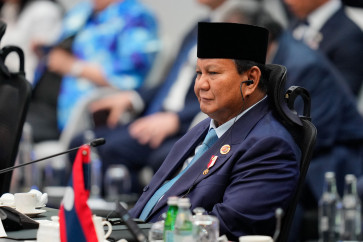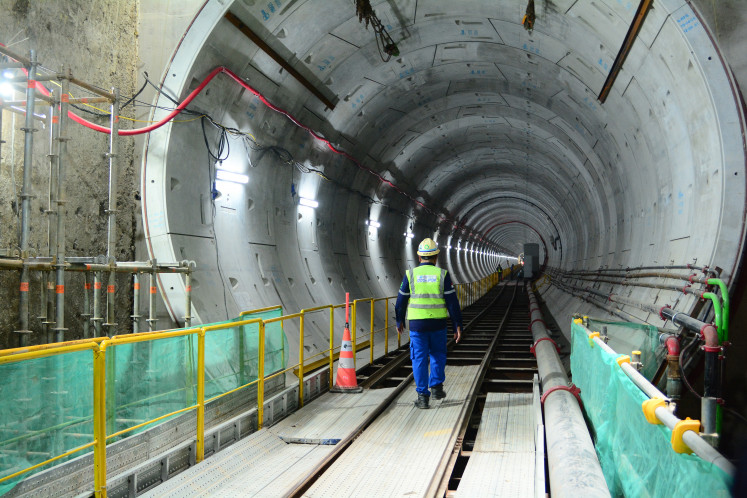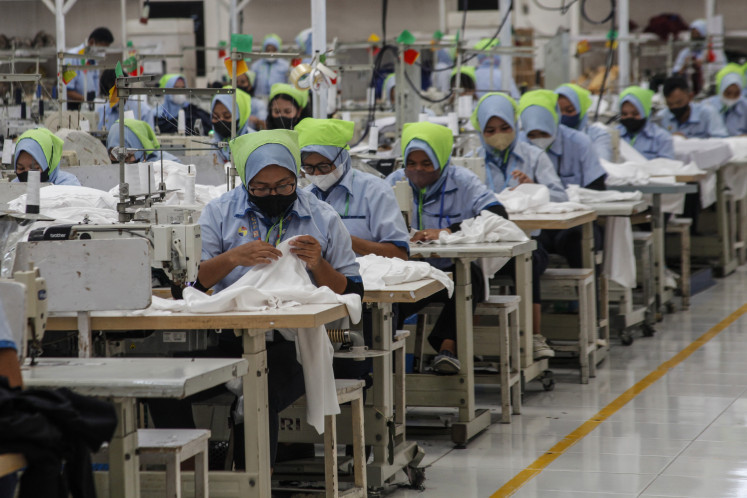Popular Reads
Top Results
Can't find what you're looking for?
View all search resultsPopular Reads
Top Results
Can't find what you're looking for?
View all search resultsCoal miners sell more in first half, but profits remain stagnant
On time delivery: A tugboat carries coal in the sea near Jakarta
Change text size
Gift Premium Articles
to Anyone
O
span class="caption" style="width: 510px;">On time delivery: A tugboat carries coal in the sea near Jakarta. Most of Indonesia's coal mining companies increased their shipment overseas in the second half of this year despite the prices of the commodity fell even lower. (JP/Arief Suhardiman)
Major coal producers reported a significant increase in sales during the first half of the year but most failed to turn favorable profits as coal market prices plunged even deeper.
State owned coal miner PT Bukit Asam sold 20 percent more coal in the first half of the year compared to the same period last year and listed coal miner PT Bumi Resources estimated that its sales volume rose 20.2 percent year-on-year in the first six months.
Other major miners also reported two-digit growth in sales volume, however, they all experienced the drop ' of around 20 percent ' in the selling price, which caused had a negative effect on their respective net profits.

Third largest coal miner PT Kideco Jaya Agung, which is 46 percent owned by Jakarta listed PT Indika Energy, reported 39.2 percent drop in net profit in the first semester of the year compared to the same period last year.
PT Harum Energy, which is controlled by local tycoon Kiki Barki, reported a net profit drop of 75.5 percent. Harum noted that it experienced a better average selling price (ASP) in the second quarter compared to the first quarter.
'The slight increase of the company's ASP was mostly due to higher average global coal prices during the first quarter,' Harum said in a note.
The company predicts more pressures on its performance in the third quarter of the year as it agreed to sell the entire third quarter production before the middle of June, when the coal price was even lower.
Moreover, it said, a more competitive market was on the horizon as Australian producers would likely discount its coal as the depreciation of its dollar against the US dollar would still improved their performance.
PT Adaro Energy, which achieved a quarterly production record of 13.52 million tons in the second quarter, shared a similar view.
'The weakening of the Australian dollar seems to have played a role in lowering the production costs in Australian dollar terms and allowing Australian producers to lower prices to make their coal more competitive in the market,' Adaro head of investor relations Cameron Tough said.
Adaro did not publish its average selling price and has not revealed its financial performance for the first semester of the year.
However, it hinted that the company experienced pressures in the second quarter of the year with the Newcastle price ' the benchmark for coal prices ' falling by around 10 percent to US$78.89 per ton by the end of June from $87.01 at the beginning of the second quarter, due to the well-supplied China domestic market.
The rupiah has also weakened against dollar. PTBA president director Milawarma said the company might benefit from the decline. PTBA, whose net profits plunged 44 percent in the first semester, reports its financial performance in rupiah. About half of its coal is sold overseas.
Meanwhile, power-station coal in China, Indonesia's main buyer, fell to a four-year low last week as industrial demand declined amid evidence the economy is slowing.
Coal with an energy value of 5,500 kilocalories a kilogram at Qinhuangdao, the country's biggest shipping port for the fuel, slid to a range of 560 yuan ($91.34) to 575 yuan a metric ton as of yesterday, the China Coal Transport and Distribution Association reported today. That's the lowest since July 27, 2009, according to data compiled by Bloomberg. Prices have decreased the past six weeks.










